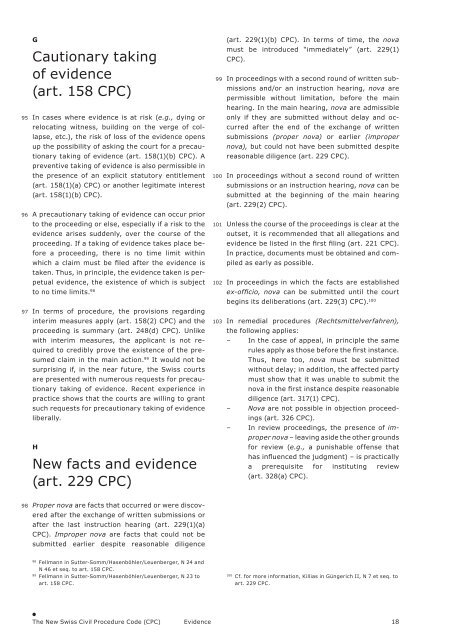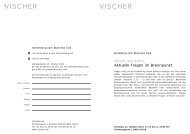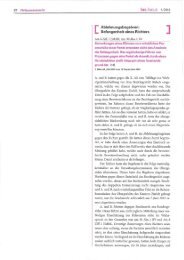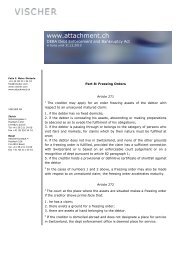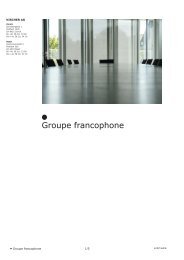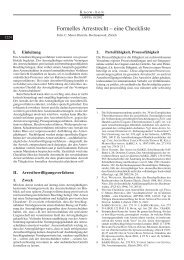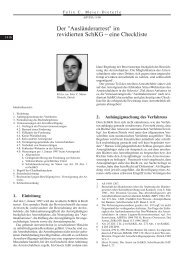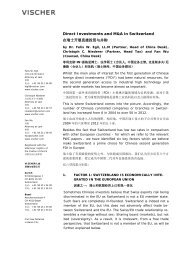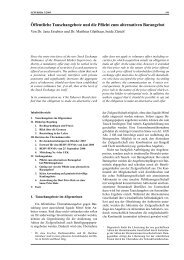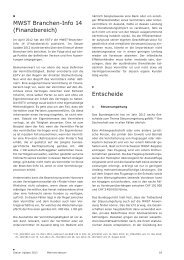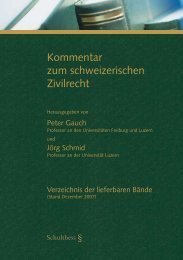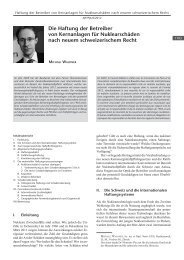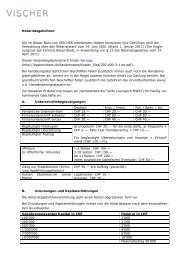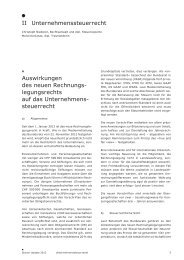The New Swiss Civil Procedure Code (CPC) - Vischer
The New Swiss Civil Procedure Code (CPC) - Vischer
The New Swiss Civil Procedure Code (CPC) - Vischer
Create successful ePaper yourself
Turn your PDF publications into a flip-book with our unique Google optimized e-Paper software.
G<br />
Cautionary taking<br />
of evidence<br />
(art. 158 <strong>CPC</strong>)<br />
95 In cases where evidence is at risk (e.g., dying or<br />
relocating witness, building on the verge of col-<br />
lapse, etc.), the risk of loss of the evidence opens<br />
up the possibility of asking the court for a precau-<br />
tionary taking of evidence (art. 158(1)(b) <strong>CPC</strong>). A<br />
pre ventive taking of evidence is also permissible in<br />
the presence of an explicit statutory entitlement<br />
(art. 158(1)(a) <strong>CPC</strong>) or another legitimate interest<br />
(art. 158(1)(b) <strong>CPC</strong>).<br />
96 A precautionary taking of evidence can occur prior<br />
to the proceeding or else, espe cially if a risk to the<br />
evidence arises suddenly, over the course of the<br />
proceeding. If a taking of evidence takes place be-<br />
fore a proceeding, there is no time limit within<br />
which a claim must be filed after the evidence is<br />
taken. Thus, in principle, the evi dence taken is per-<br />
petual evidence, the existence of which is subject<br />
to no time lim its. 98<br />
97 In terms of procedure, the provisions regarding<br />
interim measures apply (art. 158(2) <strong>CPC</strong>) and the<br />
proceeding is summary (art. 248(d) <strong>CPC</strong>). Unlike<br />
with interim measures, the applicant is not re-<br />
quired to credibly prove the existence of the pre-<br />
sumed claim in the main action. 99 It would not be<br />
surprising if, in the near future, the <strong>Swiss</strong> courts<br />
are presented with numerous requests for precau-<br />
tionary taking of evi dence. Recent experience in<br />
practice shows that the courts are willing to grant<br />
such requests for precautionary taking of evidence<br />
liberally.<br />
H<br />
<strong>New</strong> facts and evidence<br />
(art. 229 <strong>CPC</strong>)<br />
98 Proper nova are facts that occurred or were discov-<br />
ered after the exchange of written submissions or<br />
after the last instruction hearing (art. 229(1)(a)<br />
<strong>CPC</strong>). Improper nova are facts that could not be<br />
submitted earlier despite reasonable diligence<br />
98 Fellmann in Sutter-Somm/Hasenböhler/Leuenberger, N 24 and<br />
N 46 et seq. to art. 158 <strong>CPC</strong>.<br />
99 Fellmann in Sutter-Somm/Hasenböhler/Leuenberger, N 23 to<br />
art. 158 <strong>CPC</strong>.<br />
<br />
<strong>The</strong> <strong>New</strong> <strong>Swiss</strong> <strong>Civil</strong> <strong>Procedure</strong> <strong>Code</strong> (<strong>CPC</strong>) Evidence<br />
(art. 229(1)(b) <strong>CPC</strong>). In terms of time, the nova<br />
must be introduced “immediately” (art. 229(1)<br />
<strong>CPC</strong>).<br />
99 In proceedings with a second round of written sub-<br />
missions and/or an instruction hear ing, nova are<br />
permissible without limitation, before the main<br />
hearing. In the main hearing, nova are admissible<br />
only if they are submitted without delay and oc-<br />
curred after the end of the exchange of written<br />
sub missions (proper nova) or earlier (improper<br />
nova), but could not have been sub mitted despite<br />
reasonable diligence (art. 229 <strong>CPC</strong>).<br />
100 In proceedings without a second round of written<br />
submissions or an instruction hear ing, nova can be<br />
submitted at the beginning of the main hearing<br />
(art. 229(2) <strong>CPC</strong>).<br />
101 Unless the course of the proceedings is clear at the<br />
outset, it is recommended that all allegations and<br />
evidence be listed in the first filing (art. 221 <strong>CPC</strong>).<br />
In practice, documents must be obtained and com-<br />
piled as early as possible.<br />
102 In proceedings in which the facts are established<br />
ex-officio, nova can be submitted until the court<br />
begins its deliberations (art. 229(3) <strong>CPC</strong>). 100<br />
103 In remedial procedures (Rechtsmittelverfahren),<br />
the following applies:<br />
– In the case of appeal, in principle the same<br />
rules apply as those before the first instance.<br />
Thus, here too, nova must be submitted<br />
without delay; in addition, the affected party<br />
must show that it was unable to submit the<br />
nova in the first instance despite reasonable<br />
diligence (art. 317(1) <strong>CPC</strong>).<br />
– Nova are not possible in objection proceed-<br />
ings (art. 326 <strong>CPC</strong>).<br />
– In review proceedings, the presence of im-<br />
proper nova – leaving aside the other grounds<br />
for review (e.g., a punishable offense that<br />
has influenced the judgment) – is practically<br />
a prerequisite for instituting review<br />
(art. 328(a) <strong>CPC</strong>).<br />
100 Cf. for more information, Killias in Güngerich II, N 7 et seq. to<br />
art. 229 <strong>CPC</strong>.<br />
18


